The Mechanic Read online
Page 13
Now, I watched the train … Was it the same train, driven by the same engineer? … rumbling towards me, slowing when it saw us in order to pick up another contingent of Jews or Gypsies on their ride to the end of the track! But this time, there was no magic, no thrill, only the certainty of going to my death.
I was pushed and shoved into one of the back wagons along with three hundred others. We were so crammed, I could hardly raise my rib cage in order to breathe.
Someone asked why we’d been transported to the border of Germany and Poland by lorry instead of being taken to a station nearer to Sachsenhausen. Someone else from the other side of the carriage said, ‘That’s easy. This train’s for first-class passengers only.’ We all laughed. I looked through the slats of the wagon at the guard who was standing near the railway line, pointing his gun up at us. He was astonished that we were laughing. He knew and I knew what our fate would be. Maybe these other poor bastards didn’t know, or wouldn’t believe.
There must have been ten thousand people crammed like sardines on the sidings, all being pushed on board the train. They weren’t talking to one another, they were just standing mutely or obeying orders, or staring into the void of their lives, because the SS guards were walking up and down the line with snarling salivating dogs, and because they were lost in their world of terror.
When the train had first arrived, I’d hung back as much as possible to try to be the last one on. When I was herded into the wagon, there was only room enough to stand by the door or by the slats of the wagon. Those of us like me who knew the ways of the Nazis were wise enough to keep to the outskirts of the wagon, even if it meant that our faces and mouths were flattened against the rough wood. At least then we had air. Those poor bastards who were in the middle of the wagon soon had no air to breathe. It only took a matter of half an hour before you could hear them whimpering, then coughing, until their breathing seemed to rattle.
It was the children for whom I felt most sorry. Sure, I could have given up my place next to one of the slits at the back and in the side of the wagon for a child. I could have gone to the inside. But chances are, in my condition of starvation and exhaustion, that I would have died within minutes. I needed everything I could to help me survive the journey.
Twenty hours, it took to get to Auschwitz. Twenty hours of standing in the fetid heat of a hundred people trapped in the space where once twenty cows had been herded and crowded together. Twenty hours of wanting to lie down, even to die, but having no room even to fall. Twenty of the worst hours of my life.
Of course, at the beginning of the journey, people spoke to one another. As the train pulled away from the lorries which had brought us to the border, when the guards were no longer a threat to our lives, people started to ask questions. These were the newcomers to Sachsenhausen, recent inmates about to be redeployed; hundreds and hundreds who were being resettled in the death camps of the east (yes! I knew they were death camps, even if these poor bastards didn’t).
The questions were questions of despair. ‘Where are we going?’ ‘What’s going to happen to us?’ ‘Why are they doing this to me and my family? I’m a German citizen. I’ve never been a practising Jew. I’ve never even been to Synagogue.’
Nobody except me had answers, and I wasn’t going to tell anybody. But they quickly guessed that we were heading to one of the concentration camps which everyone was now talking about, those in the east of the new and expanded Greater Germany. The war had been going on now for four years, and the whole of Germany was aware of what was happening to the Jews and others who were rounded up; everyone knew what the concentration camps were for; everyone knew of the smells of gas and burning flesh which arose in the east and in the camps in Germany and Austria. The difference between me and these people, these bodies who would be fresh meat for the camps, was that I’d experienced a Concentration Camp, whilst these poor bastards, freshly rounded up in Berlin, these people refused to believe what was happening. They knew of people who had been rounded up but never returned; but they thought they’d just been resettled. Whole districts which were once populated by Jews were emptied, and the Germans who had been bombed out of their homes were rehoused.
A man who was standing next to me, his body so close to mine that I could see into his very soul, started to ask me why I wasn’t dressed in civilian clothes. Was I a political prisoner, a criminal? He looked at my striped uniform, filthy, torn, stinking, and fetid; I could see his nose turn up in disgust. Of course, he was no thing of beauty. He’d been a U-Boat, one of those Berliners who spent their lives living underground and travelling around on the transport system day and night to avoid being in any one place for too long to lessen the chance of being spotted by an SS informant.
This man was dishevelled, but he looked at me as though I were a thing of the gutter, and when he looked closely, he scrutinised my head and saw the lice crawling in my hair, and I could see he was revolted. I could have told him how I came down to this, but better for him to learn the cruel life of the Jew for himself.
Eventually we arrived in Auschwitz, and as the train came to a halt, and the doors of the cattle wagon were thrown open, I saw the full horror of my new life. There, above the gate were the words, ‘Arbeit Macht Frei’—work makes you free. It was like the sign above Dante’s Hell, ‘Lasciate ogni speranza voi ch’entrate’—All hope abandon, ye who enter here.
Was it an obscene satire? A joke of the victor over the victim? Or was it a way of trying to inculcate into people a working habit which would enable them to accept with good grace and understand why they were being worked to death?
And then I saw the four lines of people. Fewer lines than in Sachsenhausen, but lines nonetheless. When I had first lined up in Sachsenhausen, I hadn’t known what was about to greet me. Now I knew, even though the others clearly didn’t. But these lines were somehow different. Instead of lines on racial or social or ethnic lines, it looked as if a decision had been made to differentiate people on a quite different basis altogether.
In one of the lines, which had been formed from the carriages which had arrived at the terminus first, it appeared that the elderly, or those who looked weak and sick, had been selected. In the second line were younger and stronger-looking women. In the next line were younger and stronger men; and in the last line, the shortest of all, young children had been forced together, along with dwarfs and midgets and others who looked hideous and odd. And then, when they turned around looking in fear for their parents, I realised that these children were twins. And it was then that I understood the purposes for which the people in the lines had been selected.
The first line of elderly and sick Jews and other socially undesirable people had been gathered together for extermination. Far in the distance, we could see evil-looking squat buildings, row upon row of barracks, and off to the left of them were tall chimneys from which were pouring continuous streams of grey-black smoke. Was I the only one to realise that this smoke was the last remains of some Jewish community, somewhere in Europe? The other lines of younger people were detailed for the slave labour establishments. The names of Krupp and I. G. Farben sprang immediately to mind, from what I’d been told in Sachsenhausen.
But what of the third line of people, the young twins and the deformed people? Even in Sachsenhausen, we’d heard rumours of Block 10, and the Angel of Death, Dr. Josef Mengele. These poor and tragic people had been selected for medical experiments from among those brought here to Auschwitz every year and who were deformed or twins or dwarves or homosexuals or with whom Nature had played a cruel game. So confident, so arrogant, were the Nazis, that the awful truth about the experiments was known far and wide throughout Germany, and it was the talk of the concentration camps.
We jumped—fell—down from our wagon, and were screamed at by a helmeted guard. Again, it was the snarling and salivating German shepherds which caused us the most fear, not the gun or the man who pointed it at us. As soon as they began to select us for the different lines, I kn
ew that I was dead. In my condition, emaciated and obviously weak through the labour I had performed in the past nine months, barely able to struggle up from the ground to which I’d fallen getting off the train, I was certain that I would be sent to the line of elderly and sick people selected for immediate extinction as being of no use to the efficiency of the German war machine.
The guard with his rifle pushed men and women into a holding area. With the efficiency of a butcher, he steered old and frail people to another holding pen. He came across me, and was surprised that I was wearing the uniform of a concentration camp inmate.
‘Where are you from?’ he asked gruffly. I told him. He turned and called for his Lieutenant. Over to us walked a tall, thin, angular man with a shiny peaked cap and glistening black boots. I couldn’t immediately make out the corps to which he belonged, until I saw the death’s head on his lapel. He was SS.
He looked at me in disgust, his upper lip curling. ‘You are an inmate of another camp?’ I nodded. ‘Which one?’ I told him. ‘Why are you here? This is not a train for collection of inmates. This is for a further batch of rounded up Jews from Germany.’
I tried to explain about Wilhelm Deutch, the mechanic I’d worked for at Sachsenhausen; about how he had asked for me to help him in the work he was doing. But my strength failed me. I fainted through the cold and the hunger, and I was suddenly lying on the floor at the feet of the surprised guard. I heard him restrain the dog, whose smell nauseated me because it was so close to my face … It was the smell of an animal about to attack its prey.
And then I heard a voice with which I was familiar. It came to me from somewhere in my dream. Somewhere distant.
‘I sent for this man. He’s an expert in hydraulics. I need him to help me operate the lifting equipment for the ovens. Help him up, please.’
Rough hands pulling me up from the ground. Filth on my face from falling so near to the railway track, where the feet of a million Jews had jumped down in their innocence of what fate awaited them. The hands supported me under my armpits. I tried to open my eyes, but exhaustion overcame me. And then I felt my body being somehow shifted from two people, and being supported by one. It was the mechanic. I had been draped around his shoulders, as though I were a sack of grain.
‘I’ll take him. He is to come with me,’ he told the officer.
‘First he must be processed. Deloused. Recorded as having entered the camp.’ It was a command, not a request.
‘Very well, but can we do it quickly, please?’ said the mechanic. ‘I don’t want to be here too long. This man has work to do immediately.’
Guttural comments I couldn’t understand fully. I managed to open my eyes. My face was close to the mechanic’s. He looked so happy, so hearty. His face was somehow fatter than I remembered. His breath smelled of sausages and cabbage.
He saw that I was conscious. I saw the look of surprise, then horror in his eyes. When our eyes met, I realised that he was on the verge of tears.
‘My God,’ he said softly to me, as though in soliloquy, ‘what have those bastards done to you?’
CHAPTER SIX
Berlin, Germany, 1998
CHASCA BRODERICK FELT AN unaccustomed trepidation. Certainty had marked her life; rarely had she done something unless she was sure that it was the right thing to do. She’d think through the action, consider the consequences, and then embark on the exploit with confidence.
But the past few weeks had undermined her confidence in the decision to find Joachim Gutman and, when he proved too elusive, to seek out the remaining family of Wilhelm Deutch. In America, with its public records, its judicial system giving muscle to the freedom of information acts upon which a transparent society depended, she would have been much more confident. But Europe, and especially Germany, was foreign territory, and she frankly had no idea down which lane which to proceed, and whether the direction in which she was travelling was the right or the wrong one.
Now, standing in front of the plain door in the run-down apartment block, Chasca was insecure about her next actions, and particularly uncertain about whether she was in the right place and about to see the right man. Even though the Ministry of the Interior had appropriated many of the German records held by the Occupation Forces when the Allies handed over government to West Germany and left it to its own devices in 1949, and even though the Germans were scrupulous in their record keeping, it was still such a long shot.
Yes, she was confident that the ancient records were right, and yes, that she’d traced the latest address despite the fact that the man’s family had moved three times since they settled in the home provided to them by the government in Berlin, according to the records kept of citizens just after the war … but still!
She hesitated before knocking on the door. And she didn’t know why. This was the end result of her quest, so she should be full of confidence … and the official from the Berlin Department of Civilian Records had assured her that the man outside whose door she now stood in trepidation, must, by a process of elimination, be the Gottfried Deutch who was the grandson of the hanged Nazi war criminal Wilhelm Deutch.
Chasca lifted her hand to knock on the door, still feeling a profound level of uncertainty. What if a mistake had been made? How could she say to a man, ‘Was your grandfather a war criminal?’
Maybe it was a family secret which had died when Deutch’s neck was broken as he dropped through the platform into the unyielding grip of the noose in Nuremberg. Maybe the young man on the other side of the door, the grandson of the war criminal, had no idea about his grandfather; maybe his mother and father had told him that Wilhelm was a Jew, killed in the Holocaust, or a brave soldier whose body was still frozen in ice somewhere outside Stalingrad; maybe … maybe … What lies might he have been told to protect his innocence, or to hide the family shame?
There was only one way to find out. She knocked hesitantly on the door. Her heart was pounding more loudly than the noise her clenched fist made. She listened breathlessly for footsteps. Yet the door opened a few seconds later without any sound having come from within … a carpet in the hallway.
A young woman stood there, taller than Chasca, in her midtwenties. An unattractive, heavy-set girl with brown hair pulled back severely. She wore a nose ring and her left ear was studded by metal in the way of the nonconformity of so many of the young.
‘Ja!’ she asked abruptly.
Chasca’s knowledge of German at university had been good, and in the time she’d spent over the last year in Yugoslavia, her German had improved dramatically. It was the lingua franca of the French, German, Austrian, and Swiss lawyers with whom she worked in the war crimes commission.
She said, ‘Good afternoon. My name is Chasca Broderick. I’m looking for Herr Gottfried Deutch.’
‘Gottfried? What do you want with him?’ she girl asked.
‘Is he your father?’
The young woman burst into laughter. ‘No, he’s my elder brother. Who are you?’
Chasca explained, without saying anything about the testament of the Jewish man, Joachim Gutman.
She had no idea what the grandson of the hanged war criminal would look like. Having been sired from the genes of a man who was accused of being a Nazi murderer, Chasca had an underlying fear that the man who emerged, the grandson of Wilhelm Deutch, might be a skinhead, someone who had a swastika deep-etched into his brow; that he would be wearing a leather jacket with metal studs and boots with steel caps to kick Turkish migrants to death; or that he might be dressed like a member of the SS or the Gestapo, a black leather overcoat with a leather Homburg hat to hide his short-cropped blond hair. No, that was silly; this man was a modern German. If he had short hair, it would have been cut off in obedience to the commands of some fascist puppet-master who hated Jews and immigrants. Yes, she fantasised, the man who came to the door would be a skinhead, dressed very much like his younger sister. Chasca decided to turn and run. Why was she getting mixed up with skinheads and neo-Nazis and the evil
of Hitler’s grandchildren?
But when Gottfried Deutch came to the door to see what was happening, he was wearing a quizzical expression on his face, and Chasca could barely restrain her laughter, for the man who almost apologetically greeted her with a frown below his receding hairline looked just like a care-worn accountant. He stopped at his young sister’s side and she closed the door in Chasca’s face, refusing to allow her admission, while she explained to Gottfried what this girl wanted.
And Chasca just stood there, desperately trying to hear what sounds might be coming from inside the house. Now she regretted her silly fantasies. When the door opened once more, the man facing her could so easily have been a clerk in the housing department of a town hall, or a medical officer in a hospital admissions unit, or even a lawyer. Dressed in comfortable slacks and a short-sleeved shirt, he was tall and passingly handsome and ill at ease. The frown which creased his otherwise smooth face deepened in the silence which went between them.
‘Yes?’
‘Forgive me disturbing you, but are you Gottfried Deutch?’
‘Yes. Who are you?’
Feeling less than comfortable standing outside in the hallway of the apartment block, Chasca introduced herself. She gave a brief definition of the journey that had led her to his front door, without any details of her knowledge of his grandfather’s crimes. Instead she told him …

 Birthright
Birthright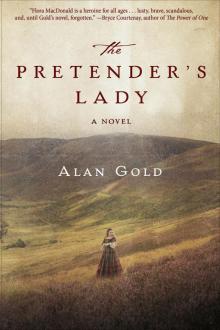 The Pretender's Lady
The Pretender's Lady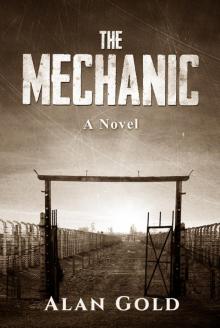 The Mechanic
The Mechanic Bloodline
Bloodline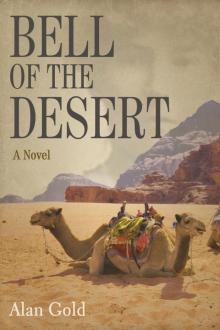 Bell of the Desert
Bell of the Desert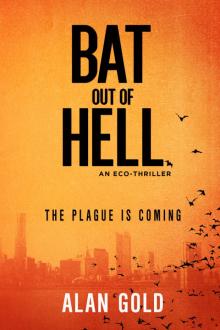 Bat out of Hell
Bat out of Hell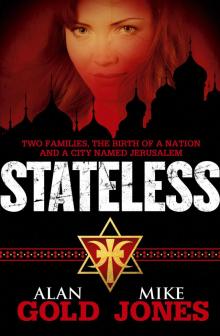 Stateless
Stateless